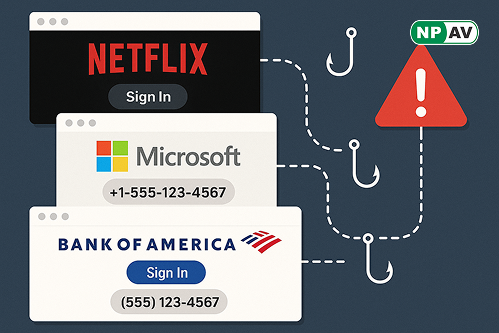Netflix, Microsoft, and Bank of America Targeted by Scam: Fake Phone Numbers Injected into Websites

Summary
A sophisticated scam operation is hijacking legitimate websites of major American companies, including Netflix, Microsoft, and Bank of America, to display fraudulent phone numbers. This attack, known as a search parameter injection attack, exploits vulnerabilities in website search functionalities to embed scammer-controlled contact information directly onto official company pages.


Key Points
- Malicious URL Parameters: Cybercriminals purchase Google ads that lead to real company websites, using encoded URLs to exploit search vulnerabilities and display fake contact information.
- Authentic Appearance: Victims see genuine company URLs and layouts, making the fraudulent numbers appear as official search results, which complicates detection.
- Attack Mechanism: The scammers craft URLs with encoded characters (e.g., %20 for spaces, %2B for plus signs) that manipulate search results to show their fake numbers instead of legitimate support contacts.
- Lack of Validation: Many corporate websites fail to properly sanitize search query parameters, allowing scammers to inject malicious content without detection.
- User Caution: Users should be wary of phone numbers in URLs, suspicious search terms like “Call Now,” and excessive encoded characters. Always verify contact information through official channels before calling any support number found in search results.


Additional Insights
This sophisticated scam not only poses a risk to individual users but also threatens the reputations of the companies involved. When customers encounter fraudulent contact information on trusted websites, it can lead to a loss of trust and credibility for these brands.
Moreover, the financial implications for victims can be severe, as they may inadvertently provide sensitive information to scammers, leading to identity theft or financial loss.
To combat these threats, companies must prioritize website security by implementing robust validation processes for user inputs and regularly auditing their search functionalities for vulnerabilities.
As cybercriminals continue to evolve their tactics, both businesses and users must remain vigilant and proactive in safeguarding against these deceptive practices. Enhanced security measures and user awareness can significantly reduce the risk of falling victim to such scams.






